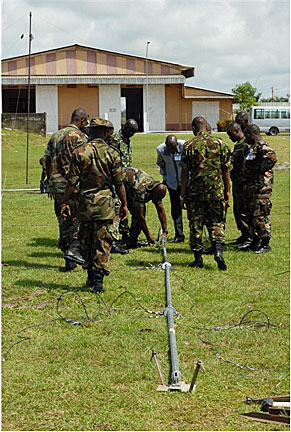
DOUALA, Cameroon - Representatives from different African nations learn how to set up a communications antenna June 19, 2012 during a workshop held at the Africa Endeavor 2012 military exercise in Douala, Cameroon.
Africa Endeavor, an annual communications joint exercise sponsored by U.S. Africa Command, focuses on the interoperability of equipment and information sharing among military representatives throughout the African Union.
(U.S. Army photo by Staff Sergeant Michelle Gonzalez)
...Africa Endeavor 2013, which will be held August 5-16 in Lusaka, Zambia. Africa Endeavor is U.S. Africa Command’s (AFRICOM) annual, 10-day communications exercise that focuses on interoperability and information sharing among African nations and partners. The exercise's primary objective is to increase the command, control, and communications capabilities of African nations by encouraging interoperable tactics, training, and procedures, as well as by creating documented standards that support interoperability.
“There is no time during an actual operation to perform detailed interoperability testing. Interoperability must be assessed and addressed before an operation is initiated,” said Army LTC Timothy Timmons, chief of the JITC Warfighter Support Division.
JITC will participate in Africa Endeavor 2013 by testing and documenting command, control, communications, and information systems (C3IS) interoperability among the participating nations and organizations in a collaborative, deliberate test bed environment. The data collected during this forum will be used as a planning and resource tool in the development of C3IS architectures during future exercises and real-world operations.
“JITC will assist AFRICOM in identifying interoperability shortfalls and developing workable solutions to achieve interoperability at a minimum cost by emphasizing the use of equipment that meets international standards, and assist in developing long-range action plans to improve interoperability among African and partner nations,” said Timmons
During the exercise, each participating nation supplies its own unique command and control (C2) equipment to an integrated coalition network intended to replicate the typical architecture used for a rapid response disaster relief situation, an African standby force deployment, or to support a humanitarian assistance mission. Additionally, JITC will develop and publish an Interoperability Guide (IO Guide). The IO Guide will contain the assessment results and cross reference the equipment used at all past Africa Endeavor exercises. The IO Guide is produced through the JITC-developed test tool suite: Communications Planning, Tracking, and Reporting (CPTR). CPTR is used to plan, schedule, track, and document the equipment, networks, and assessment results for Africa Endeavor and many other JITC-supported exercises. The guide provides operational planners with valuable information to aid the development of interoperable coalition networks to support future operations. It can be accessed via the Internet by all Africa Endeavor participating nations. Past Africa Endeavor exercises have taken place in South Africa in 2006, Nigeria in 2008, Gabon in 2009, Ghana in 2010, The Gambia in 2011, and Cameroon in 2012.
The Joint Interoperability Test Command (JITC) was among several DISA elements —including the Joint Spectrum Center (JSC) and the DISA Africa Command Field Office— that provided support for these exercises, which forged collaborative links between the United States and African nations with common stability objectives and security and sustainment goals.
JITC—a Defense Information Systems Agency command—professionally tests, operationally evaluates, and certifies IT capabilities for joint interoperability. The JITC Warfighter Support Division provides interoperability testing and assessments for the geographic and functional combatant commands. This support includes providing interoperability assessments for coalition partners, which is essential for global coalition operations such as humanitarian assistance and disaster relief.

